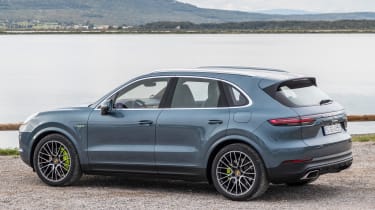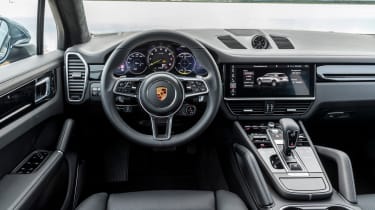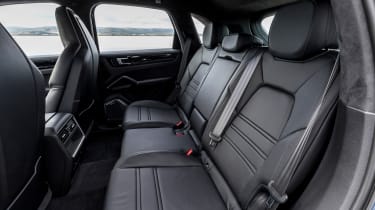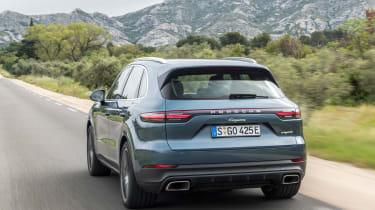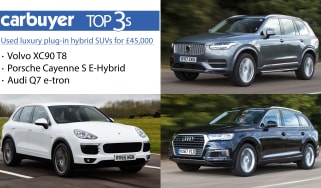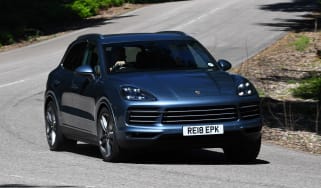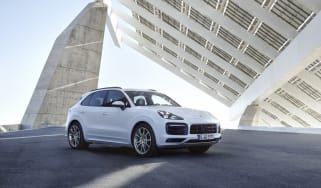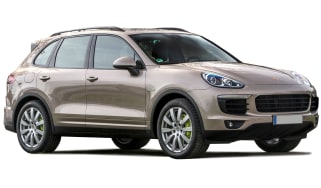Porsche Cayenne E-Hybrid SUV (2018-2018)
"The Cayenne E-Hybrid is almost the perfect package for luxury SUV buyers who want performance as well as space, practicality and reasonable economy"
Pros
- Impressive performance
- Smart interior
- Practical
Cons
- Extra weight
- Expensive options
- Official economy figures hard to achieve
The Porsche Cayenne E-Hybrid is now in its second generation and Porsche has made significant strides in improving its ‘eco-friendly’ SUV.
Rivals include the Audi Q7 e-tron, Volvo XC90 T8 Twin Engine, Range Rover PHEV and BMW X5 xDrive 40e. The most glaring difference between the Porsche and the competition is that the E-Hybrid is a genuinely accomplished performance car as well as being able to run as a full EV for up to 25 miles.
The extra weight of the Porsche’s hybrid setup is a significant 300kg, but if you go for the air suspension, the added mass barely affects the way the car handles. The E-Hybrid is so good dynamically that it makes the standard V6 petrol Cayenne virtually redundant.
It’s not only on the performance front where things have improved; the previous hybrid Cayenne had significantly less boot space than the regular version because of its batteries, but the latest E-Hybrid makes no such sacrifices. And the interior is more appealing than before, thanks in no small part to a new, large touchscreen in the centre of the dashboard.
If you’re in the market for a luxury hybrid SUV that’s comfortable, modern and spacious, then the Cayenne E-Hybrid is a strong contender. But if you want a luxury hybrid SUV that's all of those things, but also an excellent performance car, then the Cayenne E-Hybrid is essentially peerless.
MPG, running costs & CO2
The Cayenne E-Hybrid claims official economy of 83-88mpg, depending on wheel size, with CO2 emissions of 72-78g/km. Given the power and performance on offer, these are impressive figures. You can drive the car in full EV mode for up to 25 miles, so if you’re able to keep charging the car between trips, short journeys are possible without using any fuel.
More reviews
In addition to full EV mode, there are three other driving modes, one of which is Sport Plus. This has the throttle, gearbox and exhaust at their sportiest; the car uses more fuel when in this setting. If you drive the car with any enthusiasm it will lean more on the petrol engine, making it more difficult to match the quoted economy figures.
The Cayenne E-Hybrid costs £140 a year to tax, plus a £310 surcharge in years two to six of ownership because its starting price is above £40,000.
The E-Hybrid makes an appealing choice if you’re looking for an SUV as a company car. Depending on the exact spec, the car will be in the 16% or 19% Benefit-in-Kind tax bands.
Engines, drive & performance
The V6 petrol engine in the E-Hybrid produces 340bhp and once the electric motor has been added, total power is 455bhp. This gives the car a 0-62mph time of 4.7 seconds and a top speed of 157mph.
The Cayenne’s straight-line speed is impressive, but the handling is even more astonishing given how big and heavy it is, even before the 300kg hybrid system is added. The PASM adjustable dampers do such a brilliant job of managing the weight that it’s hard to tell how much heavier the car is than the standard V6 Cayenne – especially if you go for the optional air suspension as well.
Interior & comfort
The interior of the latest Cayenne E-Hybrid is more appealing than ever. The most obvious development is the large touchscreen for the infotainment system; it looks great and is very intuitive to use. A grey or black partial leather interior is standard but, as usual, full leather is an option. With the appropriate drive mode selected, the Cayenne is as comfortable as a limousine and just as quiet.
Practicality & boot space
The interior of the Cayenne is spacious, offering plenty of head and legroom for five adults. The standard seats have eight-way adjustment, while the optional seats are either 14 or 18-way adjustable, so it should be easy to get comfortable and find your ideal driving position.
The previous hybrid Cayenne suffered slightly on the practicality front as its batteries ate into boot space. That has been remedied in the latest version, with cargo space increasing from 580 to 645 litres as a result. Folding down the rear seats frees up a total of 1,610 litres.
Reliability & safety
Porsche has an excellent reputation for build quality and reliability. The Cayenne didn’t feature in the 2018 Driver Power survey, but there are few reports of mechanical problems generally.
Euro NCAP crash-tested the latest Cayenne in 2017 and awarded it the full five stars. A 95% adult occupant protection score, 80% for child occupant protection and 73% for pedestrian protection all contributed to the top score.
Price, value for money & options
The Porsche Cayenne E-Hybrid is a beautifully made SUV that can play the role of practical family vehicle, rapid sports car and sophisticated limousine whenever you want it to. That array of talent goes some way to justifying its price tag. There isn’t a better large SUV to drive than the Cayenne, either.
The options list is extensive and expensive, with metallic paint costing £750 and 10 alternative alloy-wheel designs of different sizes costing up to £3,500. A full leather interior is almost £3,000, while LED matrix headlights are £1,380. A panoramic sunroof is £1,4224 and Burmester sound system is just over £4,000.


